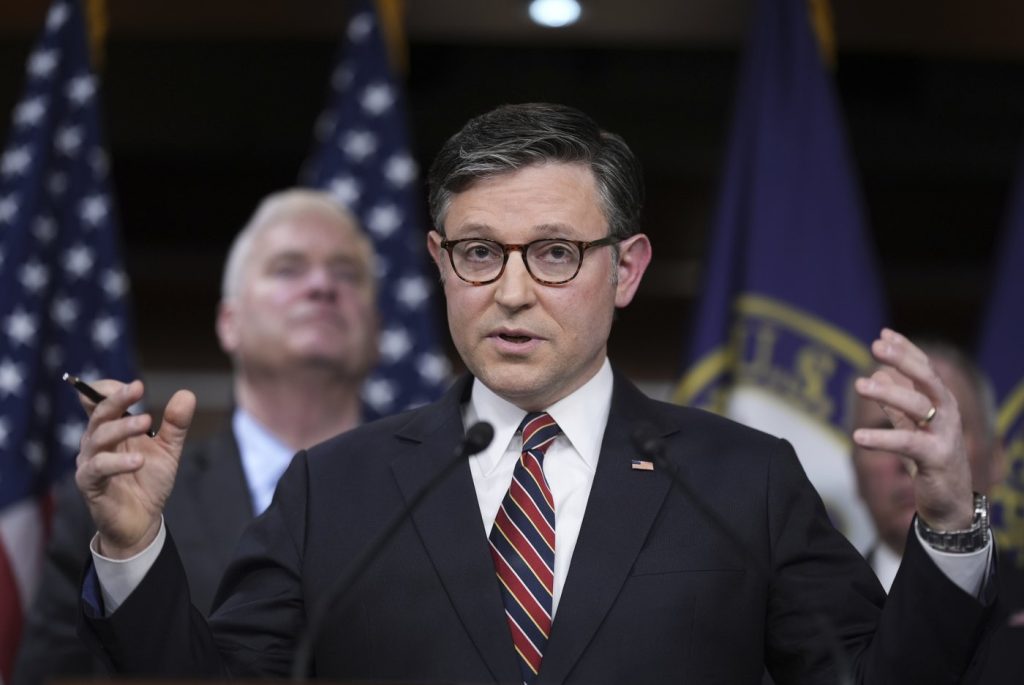WASHINGTON (AP) — Following an abrupt halt to voting in the House, Speaker Mike Johnson announced plans to reschedule votes to approve a Republican budget framework on Thursday. This decision comes after a night of negotiations aimed at addressing concerns raised by GOP holdouts, who were reluctant to endorse a package that included trillions of dollars in tax breaks without committing to deeper spending cuts.
Despite efforts to rally support, including a strong push from President Donald Trump, Johnson faced significant resistance. As a result, he had to cancel the scheduled vote on Wednesday, as Republican hardliners left him without adequate backing. This failure not only jeopardizes the proposed budget but also threatens to derail a key element of Trump’s agenda, which focuses on tax reductions, mass deportations, and a leaner federal government.
Johnson, a Republican from Louisiana, expressed the urgency of the situation, stating, “The president is very anxious for us to get this done.” Following a late-night meeting with GOP lawmakers, he hinted at the expectation of votes on Thursday. Steering the budget framework through would be a crucial accomplishment for Johnson, who holds a slim majority in the House and can afford to lose only a few votes. A failed vote could pose significant setbacks for the Republican agenda at a time when the economy is affected by ongoing trade wars initiated by Trump.
During a recent black-tie fundraising dinner, Trump urged Republicans to stop their grandstanding and push through the budget plan. He advised them to “close your eyes and get there." However, by Wednesday afternoon, the situation remained precarious with at least a dozen conservative Republicans firmly opposing the initiative. Some members, particularly from the ultraconservative Freedom Caucus, even took the unusual step of meeting privately with Senate GOP leaders to demand more substantial cuts.
As the evening progressed, Johnson convened a gathering of Republicans to explore alternative options amidst the housing proceedings, which had effectively come to a halt. He indicated that discussions with Trump were ongoing, seeking a minimal number of cuts and savings that would appease all factions. Various strategies, such as amending the Senate bill or setting up a conference committee to reconcile differences, were under consideration. Johnson emphasized the desire to ensure that all members feel comfortable with the outcome.
Meanwhile, conservative House Republicans voiced concerns over the Senate GOP’s recently approved budget framework, arguing that it did not include adequate spending cuts needed to curb rising deficits. Representative Chip Roy from Texas highlighted this discrepancy on social media, declaring, “The Math Does Not Add Up,” and stating his unwillingness to support the proposal. In a related effort, Representative Andy Harris, the chair of the Freedom Caucus, led a delegation to meet with Senate Majority Leader John Thune to clarify their stance and collaborate closely until a final product is agreed upon.
Despite these dialogues, Thune pushed back against the idea of the House sending back an amended version of the bill, expressing concern that it could lead to another prolonged voting session reminiscent of the recent weekend chaos. The intricacy of the budget negotiations signifies that both the House and Senate are only at the beginning stages of transforming their budget resolutions into legislative text, a process expected to extend over weeks or even months.
While House Democrats hold a minority position, they have voiced strong opposition to the proposed budget, labeling it as reckless and harmful to everyday Americans. House Democratic Leader Hakeem Jeffries criticized the Republican plan for advocating budget cuts that would provide tax breaks primarily to the wealthy, stating, “Hands off everyday Americans struggling to make ends meet.”
The budget framework itself is crucial for maintaining the tax breaks put in place during Trump’s first term, with potential additions to be made based on his campaign promises. This includes exempting certain incomes, such as tipped wages and Social Security income, from taxation, which could inflate the overall cost to approximately $7 trillion over the next decade. Additionally, the framework suggests funding increases totaling around $175 billion for Trump’s mass deportation initiatives, with similar amounts allocated to bolster military spending in the Defense Department.
These proposed increases would, however, be counterbalanced by significant cuts to domestic programs, such as health care, outlined in the GOP’s $2 trillion reduction strategy. There is a noted divide within the GOP, as some senators have indicated they are not ready to support such drastic spending reductions. The Senate’s approach also employs a controversial accounting method that fails to categorize the cost of maintaining the 2017 tax cuts as new spending, further aggravating dissatisfaction among House conservatives.
In the broader context, the budget proposal also seeks to increase the nation’s debt limit, allowing for more borrowing to cover expenditures. With the national debt currently at $36 trillion, the Treasury Department has warned that it could exhaust funds by August. The House GOP plans to elevate the debt limit by $4 trillion, while the Senate’s proposal raises it by $5 trillion to avoid revisiting the issue until after the midterm elections in fall 2026.
In the backdrop of Trump's trade wars, House Republicans have embedded provisions to limit actions against Trump’s tariffs, further complicating the legislative discussion.










